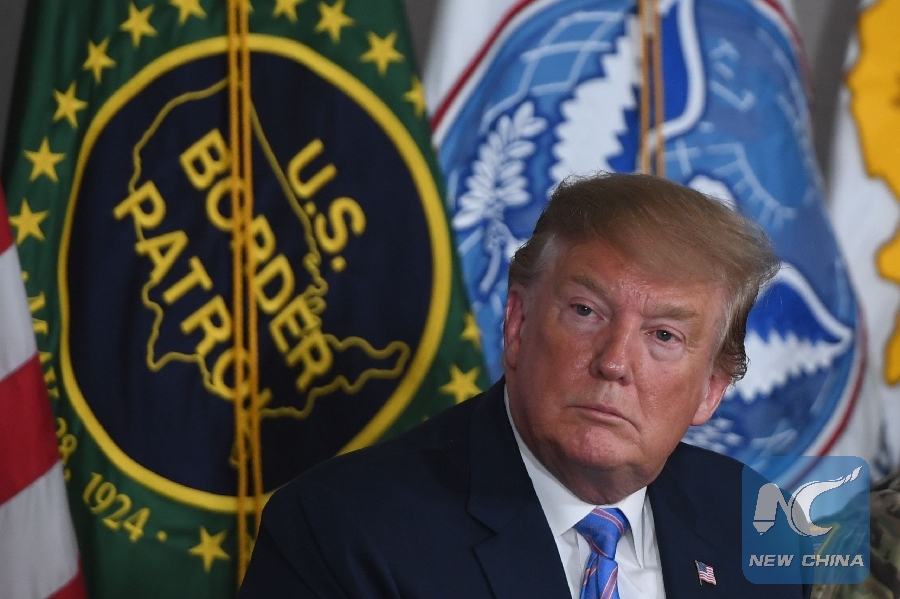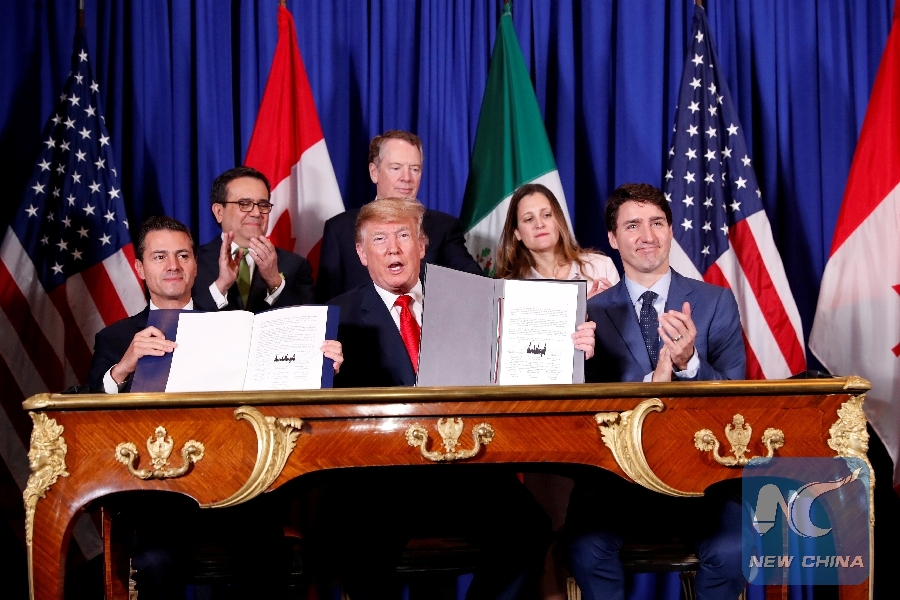
FILE PHOTO: U.S. President Donald Trump speaks during a roundtable on immigration and border security at the U.S. Border Patrol Calexico Station in Calexico, California, on April 5, 2019. (Xinhua/AFP)
NEW YORK, May 31 (Xinhua) -- U.S. President Donald Trump's threat to slap sweeping tariffs on Mexican imports has drawn wide opposition and criticism, even from his close aides, as many fear the new tariffs, instead of a silver bullet to immigration problems, will end up with higher commodity prices for U.S. consumers and jeopardize the passage of a trade deal between the United States, Mexico and Canada.
Trump said on Thursday he would impose a 5-percent tariff on all imported Mexican goods beginning June 10 so as to pressure the country to halt undocumented migrants crossing the border, and will gradually increase tariffs until the problem is remedied.
WRONG CONFLATION OF TRADE AND BORDER
Objections to Trump's use of tariffs are swift and wide-ranging.
"Trade policy and border security are separate issues. This is a misuse of presidential tariff authority and counter to congressional intent," said Republican senator Chuck Grassley, chairman of the Senate Finance Committee.
"Imposing tariffs on goods from Mexico is exactly the wrong move. These tariffs will be paid by American families and businesses without doing a thing to solve the very real problems at the border," said Neil Bradley, executive vice president and chief policy officer at the U.S. Chamber of Commerce.
Trump's surprise decision is said to have unnerved his close aides. Treasury Secretary Steven Mnuchin and U.S. Trade Representative Robert Lighthizer did not support the levy of tariffs on Mexico, according to CNBC, which also disclosed that the move is spearheaded by the president's senior adviser Stephen Miller, known for his hardline immigration stance.
"Lighthizer is not happy," an administration official told The Wall Street Journal (WSJ).
Filemon Vela, U.S. Congressman from southern Texas, called Trump's tariff plan "erratic and nonsensical," saying in a statement that the decision is to "turn one problem into another."
Among U.S. states, Texas has the longest stretch of the border with Mexico. Sharing about 2,000-km border with Texas, Mexico is the state's largest trading partner. According to the U.S. Department of Commerce, Texas imported around 107 billion U.S. dollars of goods from Mexico last year, representing 35 percent of the state's total import.
Experts believed Trump's surprise plan to levy tariffs on all goods imported to the United States from Mexico would strike a hammer blow to Texas, threatening the state's economy and causing financial pain for the state's businesses and consumers.
Stephanie Leutert, director of Mexico Security Initiative at University of Texas at Austin, tweeted "Beyond this being terrible policy, it's ridiculous to think that Mexico could stop migration."
She also warned American consumers of rising prices of commodities, retweeting that "Dear America, get ready to pay more for pretty much everything until Mexico solves a problem that no country in the world has ever been able to fix."

FILE PHOTO: U.S. President Donald Trump, Canada's Prime Minister Justin Trudeau and Mexico's President Enrique Pena Nieto attend the USMCA signing ceremony before the G20 leaders summit in Buenos Aires, Argentina November 30, 2018. (Xinhua/REUTERS)
USMCA TRADE DEAL IN QUESTION
At a time when the Trump administration is pushing for congressional approval of the United States-Mexico-Canada Agreement (USMCA), a proposed replacement for the North American Free Trade Agreement (NAFTA), such a tariff threat is believed to hamper the ratification of the new trade deal as it needs to pass in the three nations' respective legislatures.
Lighthizer argued that the announced tariffs on Mexico could jeopardize the ratification of the USMCA which is already facing a bumpy road in the Democrat-controlled House, The WSJ cited people familiar with the situation as saying.
"Following through on this threat would seriously jeopardize passage of USMCA, a central campaign pledge of President Trump's and what could be a big victory for the country," senator Grassley said.
Earlier on Thursday, the White House sent a draft of "Statement of Administrative Action" to Congress, clearing the way for the administration to submit an enforcement bill to Congress after 30 days, which in turn starts a 90-day clock for an up-or-down vote on the trade deal.
If the tariff comes to pass, Mexico "should respond in a forceful way," said Jesus Seade, the trade negotiator for Mexican President Andres Manuel Lopez Obrador, on Thursday.
In an opinion piece carried by the Forbes magazine's website on Friday, author Phil Levy argued Trump's latest tariffs against Mexico violated the recently-negotiated USMCA, and showed that "President Trump is unwilling to honor trade agreements and will repeatedly turn to tariffs to resolve an unending list of grievances."
Levy said that there is "astonishingly little policy coordination within the administration, leading to incoherent actions." He added that the tariff threat against Mexico "demonstrates that the (USMCA) deal does nothing to limit protection between the countries and kills the possibility of cooperation with Mexico."
The newly announced tariffs are also expected to particularly harm the U.S. automobile sector, one of the major concerns in USMCA. The American Automotive Policy Council (AAPC), a Washington-based group representing U.S. automakers such as Chrysler, Ford and General Motors, said the USMCA "relies on duty free access to be successful."
The imposition of tariffs against Mexico, the AAPC said, will undermine the USMCA's "positive impact and would impose significant cost on the U.S. auto industry."
Automobiles worth a total of 52.6 billion U.S. dollars were shipped to the United States from Mexico in 2018, and another 32.5 billion dollars in auto parts entered the U.S. market from Mexico during the same period, according to data from the U.S. Department of Commerce.
"Instead, Congress and the president need to work together to address the serious problems at the border," Bradley from U.S. Chamber of Commerce said in a statement Thursday following the president's announcement.

